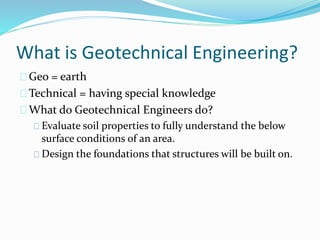How Geotheta can Save You Time, Stress, and Money.
How Geotheta can Save You Time, Stress, and Money.
Blog Article
Geotheta Things To Know Before You Get This
Table of ContentsLittle Known Facts About Geotheta.Little Known Facts About Geotheta.The Facts About Geotheta RevealedA Biased View of GeothetaNot known Details About Geotheta

They carry out website investigations, collect samples, execute research laboratory examinations, and evaluate data to assess the suitability of the ground for building tasks - Geo Tech Engineering. Based upon their findings, geotechnical engineers offer recommendations for structure layout, incline stability, keeping structures, and reduction of geotechnical dangers. They collaborate with other professionals, such as engineers, structural engineers, and building and construction groups, to make sure that geotechnical considerations are integrated right into the overall job layout and implementation
By evaluating the behavior and residential properties of soil and rock, they can determine potential geotechnical threats such as landslides, dirt settlement, or slope instability. Their experience aids prevent failures or accidents that might jeopardize lives and building. Below are some detailed duties and duties of a geotechnical designer: Website Investigation: Geotechnical designers conduct site examinations to gather information on subsurface conditions.
They interpret the information to understand the properties and actions of the dirt and rock, including their toughness, leaks in the structure, compaction features, and groundwater problems. Geotechnical Analysis and Layout: Geotechnical engineers evaluate the information gathered throughout site investigations to assess the security and viability of the site for building projects. They perform geotechnical estimations and modeling to evaluate elements such as birthing ability, settlement, slope security, side earth stress, and groundwater circulation.
Some Known Details About Geotheta
Structure Layout: Geotechnical engineers play an essential role in creating foundations that can safely sustain the desired structure. They evaluate the soil problems and load needs to identify the suitable structure kind, such as superficial structures (e.g., footings), deep foundations (e.g (https://telegra.ph/Why-Geotheta-is-Your-Go-To-for-Geotechnical-Engineers-in-South-Africa-08-02)., heaps), or specialized methods like soil enhancement. They think about variables such as negotiation restrictions, birthing capability, and soil-structure interaction to create ideal foundation styles
They assess building and construction strategies, display website activities, and carry out area inspections to verify that the layout recommendations are adhered to. If unforeseen geotechnical issues develop, they evaluate the situation and give suggestions for remediation or modifications to the design. Risk Analysis and Reduction: Geotechnical designers analyze geotechnical threats and threats linked with the job website, such as landslides, liquefaction, or soil disintegration.

Cooperation and Interaction: Geotechnical engineers work very closely with other specialists entailed in a job, such as architects, structural engineers, and building and construction groups. Reliable interaction and collaboration are crucial to incorporate geotechnical factors to consider into the general task layout and building procedure. Geotechnical designers provide technical knowledge, answer inquiries, and ensure that geotechnical demands are satisfied.
An Unbiased View of Geotheta
Here are some types of geotechnical engineers: Foundation Engineer: Foundation engineers concentrate on developing and evaluating foundations for structures. They evaluate the dirt problems, lots demands, and website characteristics to establish the most proper structure kind and layout, such as superficial foundations, deep foundations, or specialized methods like stack foundations.
They review the variables affecting slope security, such as dirt residential or commercial properties, groundwater problems, and incline geometry, and establish techniques to stop incline failings and reduce dangers. Earthquake Engineer: Quake designers focus on examining and creating structures to stand up to seismic pressures. They evaluate the seismic risk of a website, evaluate dirt liquefaction possibility, and develop seismic style criteria to guarantee the safety and strength of structures during earthquakes.
They execute field screening, accumulate examples, and evaluate the collected information to characterize the dirt properties, geologic developments, and groundwater conditions at a site. Geotechnical Instrumentation Engineer: Geotechnical instrumentation engineers concentrate on tracking and determining the behavior of soil, rock, and structures. They set up and maintain instrumentation systems that monitor aspects such as dirt negotiation, groundwater levels, slope movements, and architectural variations to analyze efficiency and give early warnings of potential problems.
What Does Geotheta Do?
They perform tests such as triaxial tests, debt consolidation tests, direct shear examinations, and permeability examinations to collect information for geotechnical evaluation and layout. Geosynthetics Designer: Geosynthetics engineers specialize in the layout and application of geosynthetic materials, such as geotextiles, geogrids, and geomembranes. They use these materials to improve dirt security, strengthen slopes, provide water drainage services, and control erosion.
They tend to be investigatory people, which implies they're intellectual, reflective, and curious. They are curious, systematic, logical, logical, and logical. Some of them are likewise social, meaning they're kind, generous, cooperative, individual, caring, useful, understanding, tactful, and pleasant - Geo Tech Engineering.
In the workplace environment, geotechnical engineers utilize specialized software devices to execute estimations, produce designs, and evaluate information. They prepare records, testimonial task specifications, communicate with customers and team members, and coordinate job activities. The office setup supplies a favorable setting for research, evaluation, and partnership with various other professionals included in the task.
See This Report on Geotheta
They regularly check out job websites to conduct website investigations, analyze geotechnical problems, and gather data for analysis. These brows through involve traveling official statement to various locations, often in remote or difficult terrains. Geotechnical designers might do dirt tasting, conduct tests, and screen building activities to ensure that the geotechnical aspects of the task are being executed appropriately.
Geotechnical engineers additionally function in specialized geotechnical laboratories. Geotechnical lab designers work thoroughly in these settings, taking care of testing devices, operating instruments, and videotaping information.
Report this page